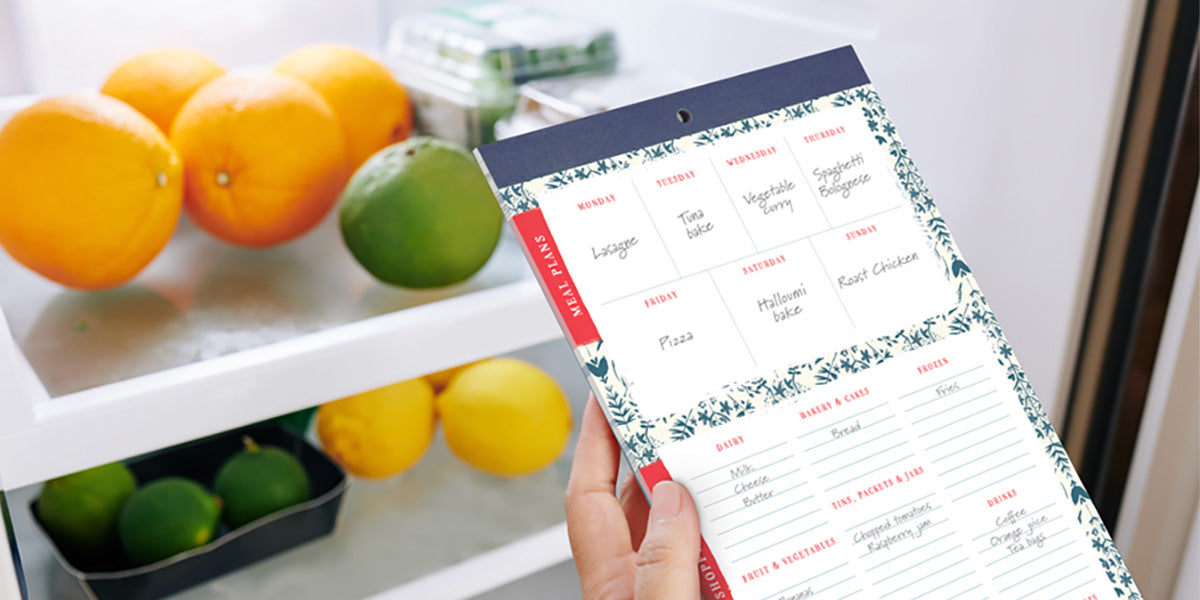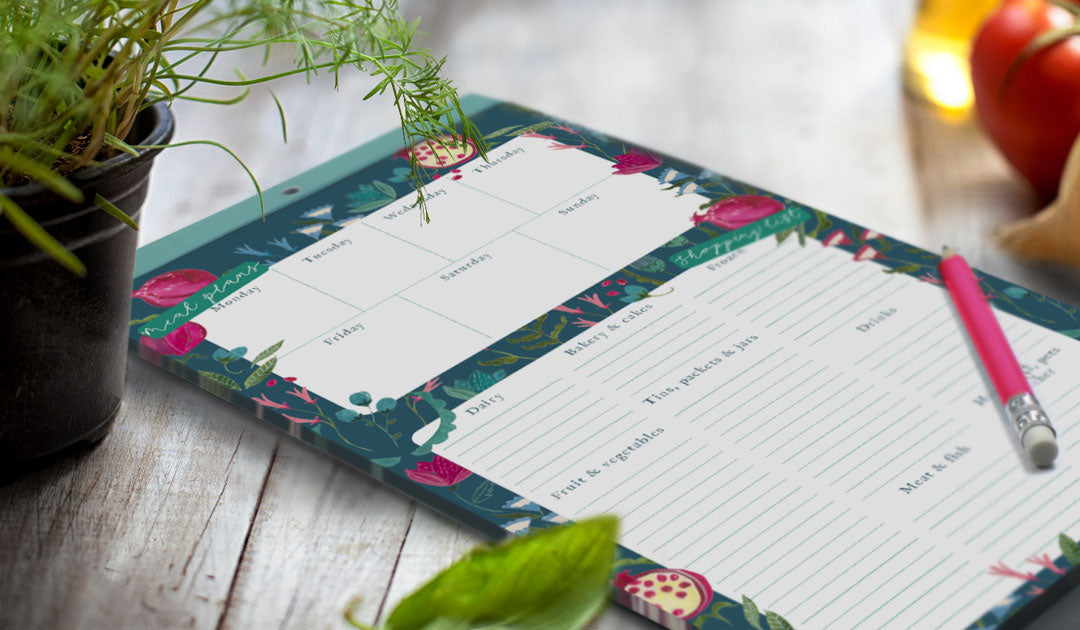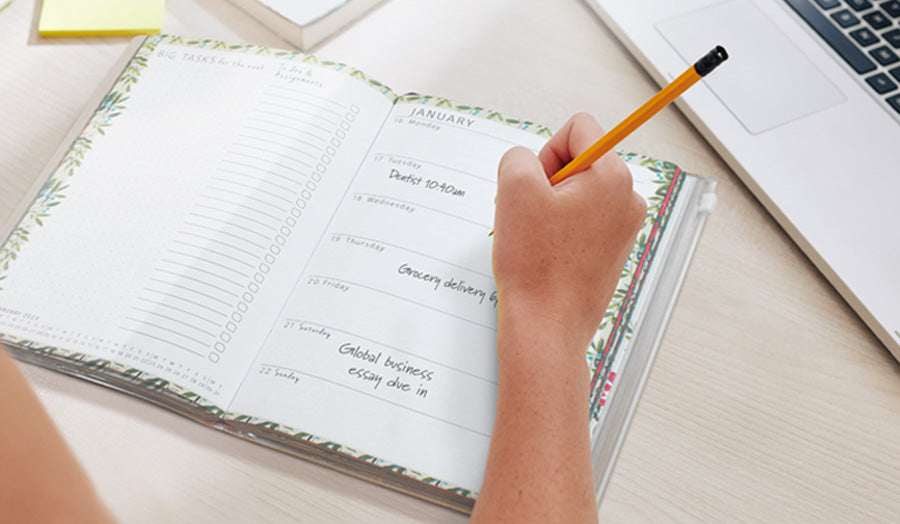
A Guide to Meal Planning for Busy People
Emily MaidmentMeal planning comes with a long list of benefits, it’s time-saving, encourages healthy eating habits and reduces waste, to name but a few. However, as with lots of things in life which we know we really should be practising, because they are good for us, a busy life can feel like it stands in the way of organisation.
The Delicious Nutritionist, Melissa Kuman, is a Registered Associate Nutritionist, Certified Confidence Coach and NLP Practitioner who knows how to lead a healthy, happy and confident life. Specialising in guiding people to feel at the top of their game, Melissa’s guide to meal planning for busy people can help you transform your kitchen habits!
“I believe meal planning is key for healthy eating and saving money! The Magnetic Menu Planner and Shopping List makes it so easy to get organised in the kitchen by preparing for the week ahead, no matter how busy your life may feel. When your cupboards are full of exciting ingredients and you have a fridge full of delicious meals, you are less likely to splurge on a takeaway and create food waste. Here are my top tips for meal planning...”
Meal Planning Top Tips
1. Plan your meals at the weekend for the seven days ahead. This can be done on your Magnetic Menu Planner and Shopping List, you can then note below the items that need to be purchased within the shopping list, before gently removing it from the pad to be taken to the supermarket. Forward planning in this way allows you to assess the ingredients you already have in your kitchen and to research low-cost, healthy recipes, saving you money and reducing food waste.
2. Eating vegetarian or vegan meals a couple of times a week, or more if you wish, is great for not only your health but for the environment too! Choose legumes, eggs, and tofu as your protein source and seasonal vegetables to reduce food miles. A meal such as Crispy Sweet Chilli Tofu is a great example of something quick you can prepare after a busy day, and it’s a tasty way to get your veggies in!
3. Plan two oily fish dishes a week, if your diet allows, to ensure you consume healthy omega 3 fats. This could be as simple as smoked salmon on crackers as a healthy afternoon snack, or an evening meal with sardines. Vegetarians, vegans and those who simply don’t like oily fish, add an omega 3 supplement into your diet and try to regularly incorporate chia seeds and walnuts into your breakfast.
4. Prepare batches of food a couple of times a week, you can plan two or three sessions into your diary to ensure you get the job done. A couple of hours on each day won’t be laborious or unachievably time-consuming; and will give you plenty of time to prepare some delicious dishes. Ideas such as whole-grain pasta dishes, lentil dhal and noodle curry soups are meals which you can make in batches to eat over a few days or freeze for later.
5. Balance your meal by including ingredients from all of the essential food groups. An example plate might include 1 handful of starchy carbs such as sweet potato, 2 handfuls of vegetables like carrots and peas, a palm-sized portion of protein from either tofu or chicken and a thumb-sized portion of healthy fats which would come from olive oil.
6. Invest in a slow cooker. This can be a really useful kitchen tool if you’re a fan of low-fuss dinners as you can simply leave your dinner cooking while you head out for the day. Slow cooker meals can be as easy as sticking some veggies and your choice of protein in the dish and leaving them for a few hours to enjoy when you arrive home. Plus as a bonus, there is only one pot to wash up!
7. Frozen fruit and vegetables can not only be more convenient than buying fresh, but freezing also helps retain nutrient content! They’re great for cooking with, stirring into your favourite breakfasts, and for making smoothies too. Storing a selection of different fruit and vegetables in your freezer is a great way to eat a diverse range of foods, ensuring you’re consuming an array of nutrients and vitamins which are essential to good gut bacteria.
8. Snack happy. If you consider snacks a part of your meal planning, regularly set some time aside to make a batch of energy balls or healthy refreshments. A mid-morning or afternoon pick-me-up can be essential to avoiding a low blood-sugar slump. Again, your snacks can be frozen to ensure there’s always something nearby, helping to avoid the temptation of spending money or reaching for something unhealthy!
9. Think big! Cooking larger portion sizes than you may initially think you need can be a great time and money saver over the course of a week. For example, one roast chicken could turn into soup for lunch, salad for dinner and even Mexican tacos for a Friday night ‘fake-away’!
To discover more about healthy eating, including scrumptious recipes and advice, you will find a wealth of information at The Delicious Nutritionist.




